#more celebrimbor
Explore tagged Tumblr posts
Text
More Celebrimbor.




Encore du Celebrimbor. Plus de Celebrimbor.
Une suite de ce billet :
#read more#more celebrimbor#celebrimbor#tyelperinquar#tyelpe#tolkien#tolkien elves#tolkien art#manga art#uchida yoshimi#silmarillion#lord of the rings#lotr
49 notes
·
View notes
Text




celebrimbor pointing out the imperfection in sauron's fabricated reality, as both of them match in skills as a creator. sauron can craft the most appealing illusion in the entire world, but celebrimbor will always sees right through the deception, due to sauron's need for order. the reality he crafted is perfect. too perfect. nothing in this world is perfect. the patterns of the mouse, and the candle is the flaw within his works. celebrimbor merely critiques it.
#the rings of power#rings of power#trop#rop#trop meta#rop meta#silvergifting#annatar#sauron#mairon#celebrimbor#telperinquar#please I AM SO BACK. more analysis coming right up!#what is that...? about how sauron can't hide anything from him..? yeah#he's a the lord of the forge#the best one in middle earth#out of many characters that can see through the weird reality bending is him#as a celebrimbor fan i am so fucking happy they show how smart he really is
1K notes
·
View notes
Text

i love this elf more than anything in this world
#MUST you be so gentle hearted#i just know that curufin was so worried when tyelpe was younger#that he's too trusting and too kind something fit maybe in valinor but not suited for beleriand#and maybe he hoped that with age tyelpe would learn how to guard his emotions better hide them closer to his chest#but despite all celebrimbor remained much the same only much more sad as he slowly became the only one of his family still standing#he's much like elrond i think#so gentle but carrying so much sadness#celebrimbor#telperinquar#tyelpe#curufin#rings of power#eregion#tolkien
807 notes
·
View notes
Text
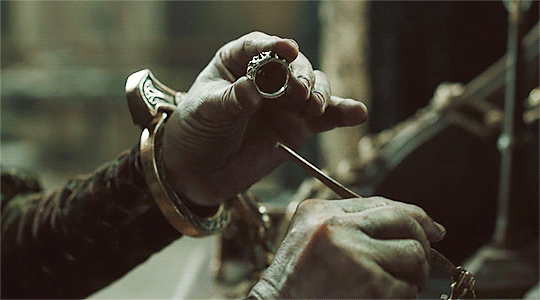
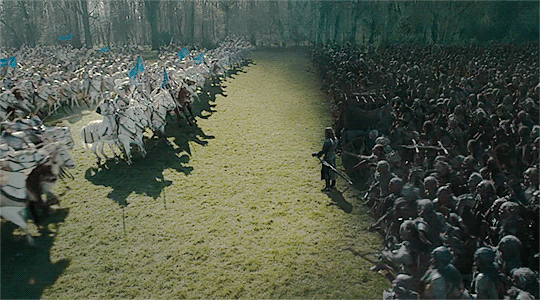
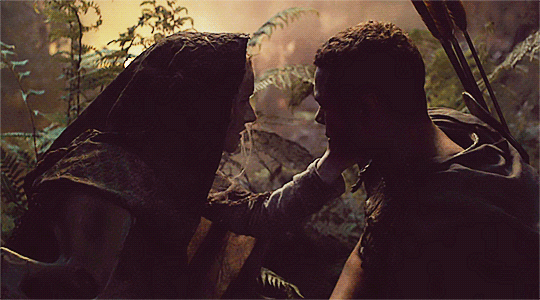
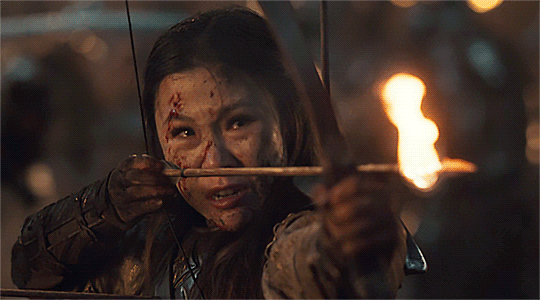

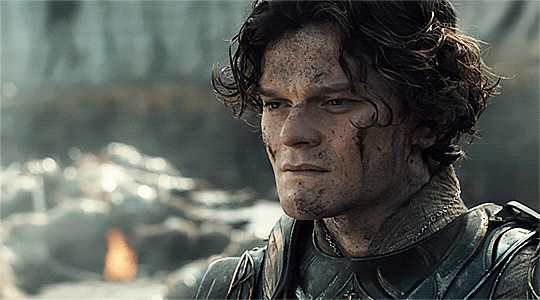

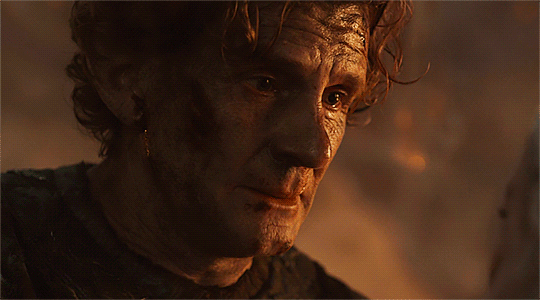
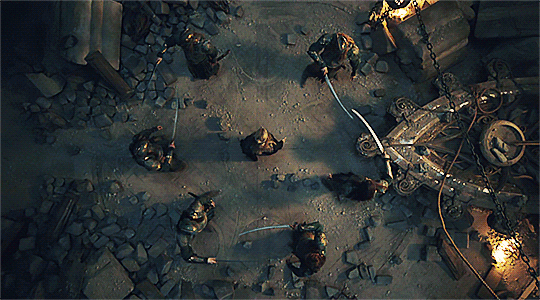
The Rings of Power 2.07
Neither of us was strong enough. There might not be anyone in Middle-earth who is. But perhaps, the Elves need only remember that it is not strength that overcomes darkness, but light. Armies may rise, hearts may fail, yet still, light endures and is mightier than strength. For in its presence, all darkness must flee. Namarië.
#trop#tropedit#lotr#lotredit#tolkien#the rings of power#rings of power#sauron#annatar#celebrimbor#galadriel#elrond#gil galad#arondir#silvergifting#silmarillion#trop spoilers#mine#gif:trop#okay okay the show is officially starting to get good and interesting. i can see they are finally giving the characters some more depth#sauron was great this ep. elrond was on point. and galadriel finally felt like her old self in the books - wise and guiding and thinking#and of course the whole tragedy of seduction madness and manipulation of celebrimbor! *chefs kiss*#im not strong enough either to say no to the pull of sauron and lotr works OTL
412 notes
·
View notes
Text
I've always wondered what the latter generation Finweans thought of the Doom of the Noldor. Most of them lived through the horrors of the First Age, suffered alongside their parents, uncles, etc even though none of them were involved with the kinslaying– hell, most of them probably weren't even alive. How do you come to terms with the fact that you are paying for the crimes of your relatives? That you were, before you were even born, doomed to suffering and death?
Did Celebrimbor think his father deserved to be slain for what he'd done during the kinslayings? Did he think he deserved it for being a kinslayer's son?
What did Galadriel think when she was cast out, even though she'd fought in defense of the Teleri? Did she ever resent the Valar for refusing to let her back for so long? Did she feel like her actions were justified, right until the end?
How about Idril? Did she think her mother's death was fair pennance for the Noldor's disobidience and the actions of her uncle Fingon? Did she ever wonder why it had to be Elenwe who suffered, when neither her nor Turgon had any part in the murder?
Earendil? He was no kinslayer, and neither was his mother or his grandfather, but the Doom came for him and Gondolin anyways. Did he resent the Valar for that? Did he resent them for leaving Middle-Earth to suffer?
Elrond? No doubt he saw, far more viscerally, exactly what unnumbered tears looked like when he stayed with the Feanorians. Did he think it was a fair punishment? Did he think his own pain was acceptable collateral damage? Did he think all of Middle-Earth was acceptable collapteral damage?
When Gil-Galad turned Annatar away from Lindon, did he do it because he suspected Annatar wasn't a true emmisary of the Valar? Or did he just not want to speak to a representative of those who had damned his people for something many of them never did?
#silmarillion#silm headcanons#house of finwe#celebrimbor#gil galad#galadriel#elrond#idril#earendil#annatar#things I wonder about#the Doom of the Noldor may have been a response to the kinslaying but it affected soooo many more people
304 notes
·
View notes
Text
Ten days later and I'm still not recovered from "Hear me — hear me! Shadow of Morgoth! Hear the dying words of Celebrimbor!"
288 notes
·
View notes
Note
Every time I see your art it makes my day brighter. Glad to hear you're doing well!
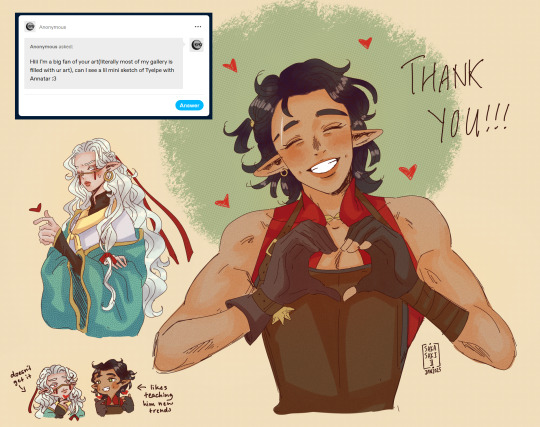
hi hi hello!!!! thanks for checking in, anons, and for the kind words!!! im doing great, though im predicting ill be a bit busy in the weeks to come, so i hope you wont mind me if i slowly slink back into posting less and less OTL I've still got a few proper pieces to be posted per my usual time, but im gonna do my best to answer more asks in-between!! anon 1, i hope your day is even brighter than how you made mine when you sent in that ask <333
here's a quick sketch of tyelpe and annatar as requested :D anon 2, im so sorry for taking so long to get to this but im absolutely flattered to hear you like my art!! most of my gallery is filled with the works of artists i study, but its a foreign concept for me to consider that my art is potentially saved in someone else's?!... im not quite sure how to put it to words.... 😭😭thank you again aaarrghhh;;;;;
its been too long since i drew these two so.... redesigned buffer tyelpe finally gets his own piece :D thank you again anons!!! i hope you both have a wonderful rest of your week! ❤️
#silmarillion#rin replies#anon asks#celebrimbor#annatar#this turned into quite a yap fest OMG im sorry#i decided to go back to my old annatar design bc i couldnt get used to his new one after all#i think im just too attached to the og one hahahaha#my tyelpe has gone through the same number of redesigns as argon 😭 but i think im happy enough with this one to keep it consistent yahoo!!#im gonna try and aim for more sketches like these so i can finally answer more asks ive been sitting on for years atp#im sorry again for taking so long but ill do my best!!!! >:DDD#sauron#silm#noldor#silm art#the silmarillion#sakasakart
158 notes
·
View notes
Text
Celebrimbor : I will not fall in the same spiral of hubris my grandfather fell into.
Also Celebrimbor : I Shall Fix The World On My Own.
#Does it makes Curufin the more normal of the three?#Damn poor guy even at hubris he gets outdone by his father and his son#celebrimbor#feanor#silmarillion
632 notes
·
View notes
Text

not sure if this has been done yet but it's all I could think while watching season 2. Brimby really going through it (insert that shot of him covering his face with his shaky hands)
#the rings of power#lord of the rings#annatar#sauron#celebrimbor#gaslight gatekeep girlboss#i firmly believe he did all three#i might go into it more in another post but his plot line was unintentionally very funny to me#blonde twink infiltrates elven city in his plot to destroy the entire world because he's just really good at gaslighting#and everyone around him is unbelievably gullible#his scheme oddly enough also involves making a lot of jewelry#im like weirdly attached to him now for some reason#i think i just really enjoy weird little guys who come up with silly schemes
280 notes
·
View notes
Text
I love Rings of Power's Celebrimbor, but if I could change one thing (other than his canonical tragic end) it would be this:
More Narvi.
More time with Narvi.
More Celebrimbor and Narvi together.
Celebrimbor ooh'ing and aah'ing over just about everything in Khazad-dum while Narvi gives him parts 1-15 of the grand tour.
Celebrimbor and Narvi bonding over their love of crafting.
Celebrimbor and Narvi and their silly inside jokes.
Celebrimbor and Narvi talking around and around the possibility that they're soulmates (platonic or otherwise).
Celebrimbor and Narvi at dinner with Durin and Disa, just having a great time.
Celebrimbor and Narvi making the doors together and laughing like idiots about the riddle.
Celebrimbor touched and close to tears when Narvi presents him with some elf-sized furniture during his latest visit.
I could go on but ...
Just more Celebrimbor and Narvi.
#celebrimbor#narvi#i get that if Celebrimbor was shown to be as close to Narvi as they were in canon he wouldn't have been easy prey for Sauron#but that won't stop me from wanting more and better relationships for him#rings of power#trop#silmarillion#tolkien-meta
223 notes
·
View notes
Text
am i the only one who thinks mairon is a minimalism bitch? like his whole thing is efficiency he probably strives for the least effort for maximum results. I mean look at his ring too it’s completely blank and simple. i imagine him not actually wearing a lot of jewelries, maybe one or two pieces to show his rank but thats it. they get in the way of his work and he KNOWS he pretty enough without them anyway, his hair is already more shiny than any gold. i imagine him being high maintenance in ways like all his clothes are simple robes but must be top quality stitching and materials, his stuff is basic in design but always very useful and made with the best materials available.
#i think this maybe why he had celebrimbor make the rings as well#because he is familiar with making armors weapons or tools#but not jewelry#tyelpe wdym i gotta make it fancier all it needs to do is stay on my finger#his simple robe made people think his humble which helped him gain more trust even though it’s the furthest thing from the truth#mairon#sauron#silmarillion#silm#annatar#angbang#silvergifting
267 notes
·
View notes
Text

Celebrimbor: Sense has chased you your entire life, but you are faster.
Annatar: ...
(source: x)
#i was planning on doing a text/theory post today but I think we need levity more urgently atm#please excuse the picture quality I am really new to making these things T_T#can you tell i loved how celebrimbor took sauron apart with words?#meme#humor#trop crack#twitter post#trop#the rings of power#incorrect quotes#celebrimbor#annatar#sauron#silvergifting#spoilers#(tagging spoilers just to make sure)#mine#my trop memes
162 notes
·
View notes
Text





silvergifting failmarriage on the big screen.. this used to be a dream.
#the rings of power#rings of power#rop spoilers#trop spoilers#sauron#silvergifting#annatar#mairon#halbrand#telperinquar#celebrimbor#i'm so glad we get more of them i was worried#like why are they so married here?
273 notes
·
View notes
Text
I need more dad Curvo content in my life. Like come on. He raised Celebrimbor. I fully believe Tyelpë is how he is in part because of his father.
Curufin saw the problems within himself and Fëanor - the immense pride and paranoia - and made sure his son grew up strong, yes, but also kind. Nurtured that gentle side because even if it was too late for him, it wasn’t too late for Tyelpë.
(That’s what pushed him to follow Fëanor, to rush out of Valinor and find a way to defeat Morgoth: Curufin needed to make a world where his son would be safe, and that inspired a passion and ruthlessness his brothers could never understand. They didn’t know what it was to see your child’s fear and be unable to do anything to reassure them. When the Trees went out Tyelpë screamed, clinging to his father and mother with a sound that would haunt Curufin until his death.)
Little Tyelpë whose heart was so good and open and trusting, it broke him to see some of that light dim in Beleriand. He tried to create areas for Celebrimbor’s inherent optimism and gentleness to flourish and grow, but in a world steadily growing more dangerous, it became increasingly difficult. Then the Bragollach happened.
Finrod wasn’t his favourite cousin, but he saw the opportunity for Tyelpë to recover and thrive. To live without his father and uncles’ bitterness hanging over his head, and he took it.
With it Curufin made sure his son wouldn’t fall to the vices that haunted his family, guiding him to assimilate into Finrod’s city and take his half-cousin as a role model no matter how he hated it. Celebrimbor wasn’t the revenge driven elf his uncles and grandfather were, and if Curvo had done this right, he never would be.
So whether he purposefully pushed Celebrimbor away from the family or not, I’m sure a part of him was so relieved and proud when he stood up, back straight, head held high, and said ‘no.’
Curufin could never draw the line when it came to his father. But he made sure Celebrimbor could.
And as far as he was concerned, he’d succeeded in far better than regaining a silmaril by the time he was killed.
#please give me more good dad Curufin#It’s a side I think affected so many choices he made#a side his brothers would never fully understand until maybe Maglor with E2#celebrimbor#tyelperinquar#tyelpë#Curufin#curufinwë atarinkë#curufinwe#atarinke#Fëanor#Feanor#house of feanor#silmarillion#tolkien#silm#silm headcanons#feanorians#ITHOF Writes#Not entirely happy on the structure of this but it’s as good as it’s gonna get#better post it before I never do 😂
180 notes
·
View notes
Text
Sauron, Galadriel, & Tolkien's Theology of Repentance - Part One

Summary: Character meta analysis on Sauron (and Galadriel, through the lens of Sauron). Based on both Silmarillion & RoP canon. 3.5k words. Discussion of Catholic theology involved. Blanket TW for discussion of violence, manipulation, etc., because Sauron. Spoilers for S1 & S2 and the Silmarillion, of course. The tragedy of Sauron is that he gets offered so many legitimate chances at redemption and forgiveness, and he denies them every single time. But we know he wants absolution, because that’s what he sees Galadriel as: his chance to bind himself back to the light, to be Mairon again, to heal the pain that he caused and that was caused to him under Morgoth. But because he has such a warped view of himself and his actions, he dismisses genuine extensions of compassion, forgiveness, and care as simultaneously beneath him and too good for him. And yet, he still pursues redemption, but through none of the channels offered to him.

In The Rings of Power, he’s given the explicit instruction to change for the good in the village after he’s reborn. He’s given the chance leave his past behind and work meaningfully in Númenor. He’s given the chance to redeem himself by Galadriel's offer of friendship (or love, depending on your interpretation). In the Silmarillion, he's even given the chance by Eönwë himself, and comes close to leaving Morgoth behind completely!
Let's look at this passage from Of the Rings of Power and the Third Age (emphasis mine):
When Thangorodrim was broken and Morgoth overthrown, Sauron put on his fair hue again and did obeisance to Eönwë the herald of Manwë, and abjured all his evil deeds. And some hold that this was not at first falsely done, but that Sauron in truth repented, if only out of fear, being dismayed by the fall of Morgoth and the great wrath of the Lords of the West. But it was not in the power of Eönwë to pardon those of his own order, and he commanded Sauron to return to Aman and there receive the judgement of Manwë. Then Sauron was ashamed, and he was unwilling to return in humiliation to receive from the Valar a sentence, it might be, of long servitude in proof of his good faith; for under Morgoth his power had been great. Therefore when Eönwë departed he hid himself in Middle-earth; and he fell back into evil, for the bonds that Morgoth had laid upon him were very strong.
This passage is clear that Eönwë is willing to pardon Sauron--he simply did not posses the power to do so. But when Sauron was told he must appeal directly Manwë, he gave up entirely and skulked back to Middle-earth. There are a few ways to read this:
1. He was not wholly repentant
Sauron simply wanted the protection of a new master in the absence of Melkor. i.e., he was rather fickle and simply wanted to be on whatever the "winning" side was. This is supported by the text literally saying that at least some of his obeisance was completely false, and that he only made a point of feeling bad about anything once his master had been chucked into the Void and his armies and strongholds were being destroyed (Thangorodrim). In this reading, perhaps Eönwë saw Sauron's treachery and referred him to Manwë knowing that it would be a test of his true intent. However, while a valid interpretation, I believe this to be the less holistic of the two.
2. He was truly repentant
Sauron did truly feel badly and "abjured all his evil deeds," but he was unwilling/unable to humble himself after being so fundamentally broken by Melkor and developing an insatiable power lust (hey, he isn't defined in the narrative by lust and pride for nothing).
Earlier in this same chapter, Tolkien wrote that Sauron could "...deceive all but the most wary." This is in the specific context of his physical shapeshifting. But, I would argue that this can also be tied to his lies. Tolkien has a specific ethic of beauty, where physical perfection is equated with moral goodness. Sauron completely inverts what is otherwise a hard and fast rule within Tolkien's writings by being the character most frequently described as "fair"--seven times to Lúthien's six, and she was the most beautiful woman to have ever lived!
(Side note: I have another post on Tolkien & beauty in the works where I'll get more into this idea)
Why does this matter? Even though this interaction with Eönwë takes place in the First Age, Sauron could at this point be in the demonic form Mirdania describes in the forge. And, I am inclined to believe that Eönwë, as the head Maiar and herald of Manwë, would be a pretty wary guy, and thus able to sense any of Sauron's trickery. I read this to mean that Eönwë looked at Sauron and saw his potential to be Mairon again, either in absence of his evil form or in spite of it.

Because Sauron is incredibly beautiful. And even if it is a disguise of the true, depreciated form of his spiritual essence, he presented himself to Eönwë at his most beautiful. He wanted, even in his act of repentance, to make himself more favorable in Eönwë's eyes. To show up as Mairon (who was likely close friends with Eönwë before everything went down, since they are considered to be two of the most powerful Maia and would have worked closely together).
But I don't think this was all manipulation on Sauron's end. I agree with the scholars mentioned in the text who believed that Sauron was truly repentant--which is why Eönwë even bothered referring him to Manwë instead of kicking him into the Void with Melkor.
And this is the tragedy: Sauron is told exactly how to repent, and believes fundamentally that it is an impossible path for him. And yet, he still longs so intrinsically for it! He was, under Aulë, a Maia of precision, perfection, and order. Under Morgoth, he feels disordered, dis-regulated. He needs to correct the fundamental imbalance within him, so why does he flee Eönwë?
It comes back to Sauron's pride.

If he follows through with this path of reconciliation, there is no way he can hide or pretend his actions away. If he cannot trick his fellow Maiar, he certainly cannot trick the Valar. And he cannot stand the idea of submitting himself back under their rule, especially now that he has tasted power. This is a pride wound; it is why the idea of confessing to Manwë would be humiliating to him as opposed to just upsetting/uncomfortable.
Again, the pivotal moment: he is told how to make amends for crimes and determines that he cannot do it. So he returns to Middle-earth and stews in his own self-hated and self-pity for a few years. In that time, he consciously or subconsciously latches onto Eönwë's offer--forgiveness from penance. It is the way forward. And if he cannot earn penance at Manwë's hand, he will do it on his own.
The Prodigal Son
This is where we have to talk about the Catholic roots of Tolkien's work for a moment. The scene where Sauron approaches Eönwë mirrors the biblical parable of the prodigal son. In this story, a man abandons his family, spends all his money, and falls into ruin. But when he recognizes his failings and returns to his father to get help, he is welcomed back into the family without question--in other words, he is forgiven and restored to his former position.
17 But when he [the prodigal son] came to himself he said, “How many of my father’s hired hands have bread enough and to spare, but here I am dying of hunger! 18 I will get up and go to my father, and I will say to him, ‘Father, I have sinned against heaven and before you; 19 I am no longer worthy to be called your son; treat me like one of your hired hands.’” 20 So he set off and went to his father. But while he was still far off, his father saw him and was filled with compassion; he ran and put his arms around him and kissed him. - Luke 15:11-32, NRSV CE (emphasis mine)
The parallel is clear; Mairon, the repentant Maia, returns home with hopes of reconciliation. He is prescribed the same task that the prodigal son offered to his father: he must be bound in servitude to his father/creator in order to pay off his debts. This is a deliberate allusion from Tolkien. The story of the prodigal son models the path of reconciliation that Eönwë describes. Tolkien seems to be drawing a line in the sand with this: Sauron is unwilling to do the work required by the Valar for repentance, so he is unable to receive the grace of a warm welcome back into the fold of the Ainur. Since he did not humble himself, he has to be told to do it. And he does not want to! He wants to be loved, but he also wants his power--evidence, in a way, of how his character was fundamentally altered in his time with Morgoth.

His pride--and his fear--cut him off from the potential of grace. He does not know for certain that Manwë would subject him to servitude (though I would argue that it's textually evident that it is a custom), but this assumption leads him to flee, which allows him to slip back into his old ways.
He wants to be Mairon (admirable) again, not Sauron (abhorrent). He wants to be accepted and loved, but not punished. He wants the benefits of reconciliation without the work he would have to do to earn it or the shame he would feel as he did. It's pride, but it's also deep shame--the flip side of his extreme ego is an implicit self-hatred, one that we can see in the subtext of how he speaks about himself and about his time with Morgoth.
Even the language Tolkien uses is heavily shame-coded, especially in a Catholic context; Mairon did not go willingly, he was "seduced." He admits to Celebrimbor that he was "tortured by a god". It becomes exceedingly clear through both text and on-screen canon that Sauron was routinely broken and abused for centuries. This has fundamentally damaged his self-perception, which is ultimately what leads him to "[fall] back into evil"--whether due to pride or shame, he hides, perhaps because he consciously or subconsciously does not believe that he deserves forgiveness, no matter how much he craves it.

Naked in the Garden
His flight back to Middle-earth after meeting Eönwë is reminiscent of another biblical scene, where Adam and Eve, after committing the first sin, hide from God in shame and fear (emphasis mine):
7 Then the eyes of both were opened, and they knew that they were naked...9 But the Lord God called to the man, and said to him, “Where are you?” 10 He said, “I heard the sound of you in the garden, and I was afraid, because I was naked; and I hid myself.” -Genesis 7-10, NRSV CE
The image of nakedness is, here, one of vulnerability, and Tolkien establishes that Sauron fears that which he cannot control. He needs the Rings under his power. He needs his armies and his enemies under his watchful eye. He is petrified of letting his power slip away (possibly due to never wanting to feel powerless in the hands of a Vala, fallen or not, again).
The biblical allusion here hearkens back to the fear Tolkien describes Sauron as feeling regarding his return to the Ainur. In the religious system Tolkien has established, which is likely inspired by his own religious beliefs, Sauron has sinned, and must make penance. But he is afraid of God/Manwë, and does not want to "let go" of his sin. In other words, he is not truly repentant. This reflects the Catholic sacrament of confession, which requires self-reflection and resolve to never commit the sin again.
Instead of shame driving him to contrition, it drives him to isolation.
But he still wants forgiveness. So, in his years of hiding in Middle-earth, he decides to earn it himself. His own way.

Enter the Rings.
Sauron wants to perfect the wrong he wreaked so that he can both earn his way back into the Ainur and keep his power. But what he does not realize is that this does not work. Eönwë is clear that he must forsake his true temptation--absolute power--through penance by submission. Yet Sauron in his pride thinks he can have it all. Sauron is a very carefully controlled villain, and the only times he snaps or makes significant mistakes are when his inflated self-perception is challenged, revealing the self-loathing and/or self-pity underneath. The best example of this is when he kills Celebrimbor prematurely, and cries afterwards. Why? Because Celebrimbor was right about him, and he hates it. He hates knowing that he is nothing more than the Morgoth's shadow, because Morgoth was his master as much as he was his tormentor. As Sauron puts it, his relationship with Morgoth was often defined by pain as a test to see "whose will was the mightier":
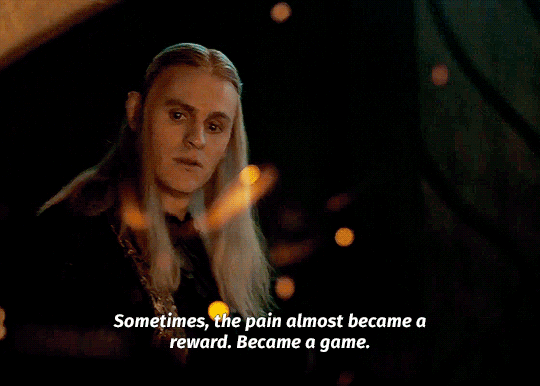
This image carries more shame, both in its implicit sexual connotations and in the simple power dynamic of it. Sauron, even though misguided, is rallying against Morgoth. He wants to break what Morgoth has created and build something new, something better, something apart from his old master entirely. But Celebrimbor confronts him with reality: he has not created something new, and perfect, and special, as he so wanted to--he can only act in imitation, not in generation. And when he got close with the Rings, it cost him everything. It's almost like he wants the power of a Vala, and loathes that he cannot attain it.
And this is why he becomes so singularly obsessed with Galadriel.

She’s his foil. They both crave power and adoration, but in the end of things, she does not fold under his temptation. She turns down everything she has ever wanted for the greater good and for the sake of her own soul. Sauron looks at Galadriel and perceives that she would have succeeded at Eönwë's test because she is willing and able to humble herself. This maddens him to the point of both desiring her and desiring to break her.
She learns that she is easily tempted and becomes strong enough to handle it (through a lot of tough love from Elrond & co.). She has to learn how to do it, but she is able to.
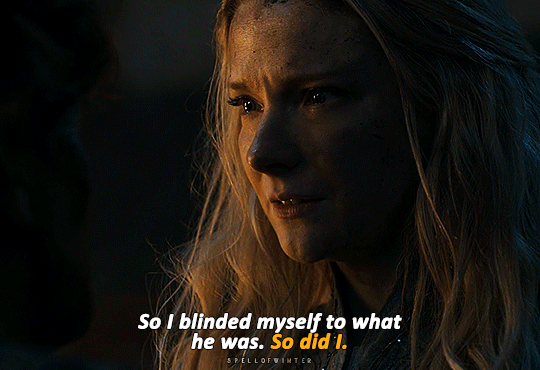

She grows from someone who resisted and rejected authority to someone who is trusted as an authority because of her ability to wield it wisely (see: Gil-galad allowing her to answer for him in 2x08).
In other words, she earns the trust, love, and support of her community. Sauron has to force his to comply—it is an illusion of love.
His possessive obsession with her also stems from her fairness. She was the object of her uncle Fëanor's obsessive desire for creation as well. Her hair was the inspiration of the Silmarils (see: The History of Galadriel and Celeborn; The Shibboleth of Fëanor - source with page #s here), which Morgoth desired more than anything to possess.
Sauron, wanting to spite his master, wants one better--to own that which inspired the Silmarils, to own the image of fairness (and thus of moral good) completely. This is why he wants to bind himself to her. This is why he needs her. He sees Galadriel as his mechanism of repentance, and his last triumph over Morgoth. Winning her is his salvation as much as it is proving that his will is the mightier. It is his way of dominating Morgoth. This starts, I think, as a genuine effort at proving himself to the Valar, but quickly consumes him entirely. He is overcome with the desire for revenge, just as Galadriel was at the beginning of the First Age.
And he sees this in her. Sees their similarities. Sees that she, too, is angry and lonely and so afraid of losing her power. And he leverages that to befriend her. This is where it gets ambiguous and you can read RoP as either painting the image of Sauron being earnest but completely misguided in his proposal, or you can see it as him being entirely manipulative.
I think the truth of that scene probably falls somewhere in the middle; just like when he presents himself to Eönwë, he is sincere in his desire, but only knows how to present it in an inherently contriving way. He does want to bind her to him, so he tries to only reveal to her the good aspect of that desire (and also of his desire for power, which he allows her to see because he believes that it is good and also because she understands it), and not the ugly underside of his internal struggle against Morgoth, the Valar, and himself.
And I do think, in his own way, he cared about her. Galadriel consistently shows kindness and compassion to him. In S1, they grow to know each other's minds and souls, and she considers him a close friend. He finds comfort in this, that someone could see the blackness of his heart and care for him anyway. He thought, in his isolation, that he lost that chance when he fled back to Middle-earth. And here is the very picture of the light itself telling him that she supports him, that she sees the good in him, that she wants to help him set the world to rights! Of course he is infatuated by this. Of course he also wants to use it. He is Sauron.
But Galadriel succeeds where he fails, so he stops playing nice and tries to forcibly drag her down with him. First, by baiting her with the image of the man she cared deeply for:
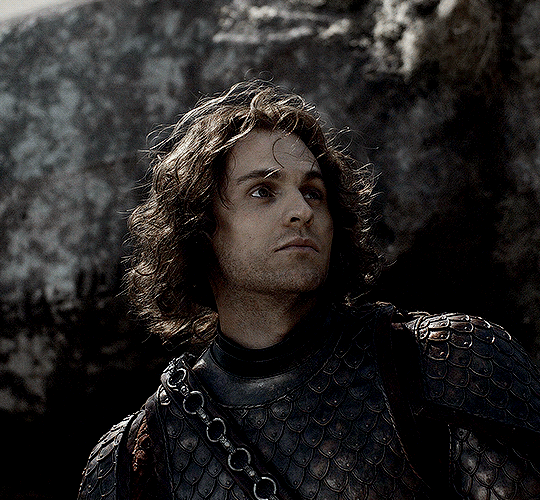
Then, by reminding her of all she is losing by rejecting him:

And she is still strong enough to say no. And not just to say no, but to shut the door completely. To look in the face of everything she has desired for centuries and turn it down, understanding that it will ruin her. Yes, she hesitates. Yes, she still wants it (wants him). But she wins the day by holding fast to the light that Sauron wishes so badly to bind himself to.
Because she has lost everything--her brother, her husband, the station as commander, the trust of her high king and best friend--and earns it back only through her resistance of her greatest temptation. It is a struggle, it is painful, it nearly kills her--but she does it. She wins the test that Sauron could not even bear to face.
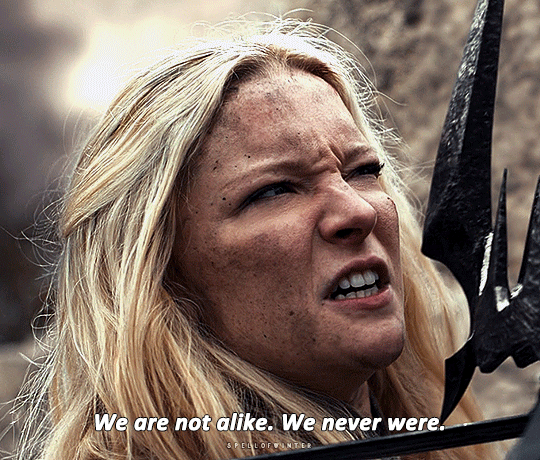
In their headlong, self-sacrificial tendencies, they are the same. Both view themselves as fundamentally stronger/better than their peers while also being deeply lonely due to their self-imposed isolation (Galadriel's laser-focused hunt for revenge, Sauron's exile in Middle-earth). But to Galadriel, the light is more important than her pride.
For Sauron, the light is his source of pride. He desires it more than anything, but condemns himself to never being able to touch it due to his rejection of Eönwë's offer. Paradoxically, he tries to grasp at it through Galadriel, the living silmaril, and succeeds only in darkening her. We learn from Gil-galad in 2x08 that his crown piercing her flesh in an act of brutal domination nearly strips her soul from her and pitches it into the unseen world. In this, Sauron is saying: If I cannot have you, I will force you to need me. I will break you into loving me.

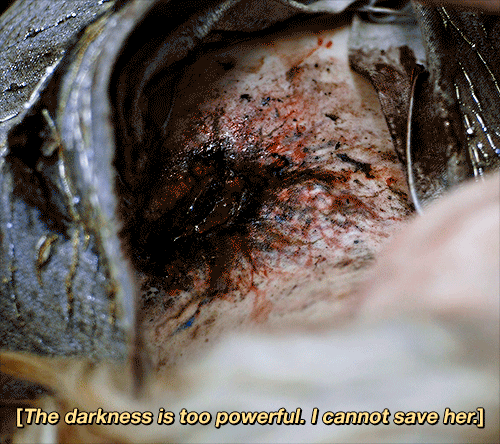
He says this to Celebrimbor as well. He no longer knows how to love properly. He only knows how to inflict pain until this object of his obessive desire needs him--just like how his immortal spirit was broken into submission by Morgoth. And isn't this revealing of his own sense of self? He refuses to suffer the path of light, but willingly suffers the maddening path of darkness because it is a comfortable, familiar suffering. One, he tells Celebrimbor, he even grew to enjoy (2x08). As the path of the Rings drive him madder and madder, his desire for the light (Galadriel) and the return of his power (Celebrimbor) become further disordered and corrupted until they culminate in him destroying them--and his chance at earning/owning them--entirely.

And this is Sauron's ultimate point of no return (which we will hopefully see in S3 🤞). The razing of Eregion and slaying of Celebrimbor were acts of petty rage he committed when his pride was injured. This was the final nail in the coffin. Galadriel, in her rejection of him, ruins what he sees as his true chance for redemption.
Galadriel, now stepping into the role of Eönwë, re-opens the invitation: "Heal yourself!" (2x08). But in rage and shame and stubborn pride, he turns it down again. I believe this is where his desire to heal Middle-earth shifts fundamentally into desire to dominate Middle-earth. He always wanted to rule, but now he wants to own.

#fae speaks#I spent hours pouring thru the Silm and RoP for this so if you enjoyed please let me know I'd love love love to talk about it more <33#sauron is my favorite freak in all of tolkien's lore rn I want to study him like a bug#btw this is saurondriel (and even silvergifting? if u squint) positive but with loads of nuance. i see haladriel as love and saurondriel as#possession. both are fun in fiction of course but I want to acknowledge how deeply messed up the dynamic is#but also! it's fiction! do whatever you want with it! if you want saurondriel to get a happy ending then do it <3#and send me the fic so i can read it because i'm team half-maia celebrian hehe#also if there are any glaring gaps in my knowledge of the silm pls lemme know it's been a minute since i've read it all the way through#part two will be on beauty and evil in tolkien's cosmology :)#tolkien#the silmarillion#the rings of power#rings of power#trop#rop#sauron#halbrand#annatar#galadriel#sauron x galadriel#saurondriel#haladriel#trop spoilers#trop season 2#trop meta#rop meta#rop theory#trop theory#celebrimbor#my metas
168 notes
·
View notes
Text
My flavour of Silvergifting is not Celebrimbor being heads over heels for Annatar while Annatar only pretends. It's Annatar being absolutely obsessively consumed with Celebrimbor and his work and not leaving his side for a moment until Celebrimbor falls for him.
Celebrimbor greatly appreciates that the Valar sent him this beautiful Emissary, and he certainly finds him lovely but he's a little bit too clingy sometimes, he just keeps staring at him, it's a bit unnerving. He falls for him eventually but it takes a while.
Meanwhile Annatar is obsessed with earning Celebrimbor's full affection, he knows he can't flounder him like Melkor did with Feanor. And then there's another layer with him planning to ensnare Celebrimbor and the Eregion elves with the Rings, he is NOT normal about him.
#silvergifting#celebrimbor#annatar#sauron#silmarillion#Celebrimbor being in unrequited love with Annatar is so tired to me#i greatly prefer Sauron being way more obsessed with Celebrimbor than Celebrimbor is with him initially#then the two of them being equally insane about each other#until the relationship falls apart
203 notes
·
View notes